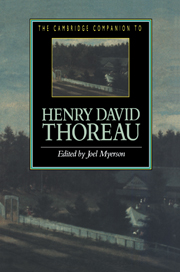Book contents
- Frontmatter
- 1 Thoreau’s reputation
- 2 Thoreau and Concord
- 3 Thoreau and Emerson
- 4 A Week on the Concord and Merrimack Rivers
- 5 Thoreau as poet
- 6 Thoreau and his audience
- 7 Walden
- 8 Thoreau in his Journal
- 9 The Maine Woods
- 10 A wild, rank place
- 11 Thoreau’s later natural history writings
- 12 Thoreau and the natural environment
- 13 Thoreau and reform
- Further reading
- Index
- Series List
1 - Thoreau’s reputation
Published online by Cambridge University Press: 28 May 2006
- Frontmatter
- 1 Thoreau’s reputation
- 2 Thoreau and Concord
- 3 Thoreau and Emerson
- 4 A Week on the Concord and Merrimack Rivers
- 5 Thoreau as poet
- 6 Thoreau and his audience
- 7 Walden
- 8 Thoreau in his Journal
- 9 The Maine Woods
- 10 A wild, rank place
- 11 Thoreau’s later natural history writings
- 12 Thoreau and the natural environment
- 13 Thoreau and reform
- Further reading
- Index
- Series List
Summary
Thoreau’s reputation is unique. It has a pattern all its own, filled with paradoxes and contradictions, and widely vacillating from decade to decade. In his own day he was generally dismissed as a minor writer who would soon be forgotten; yet in our day he is universally recognized as one of the few American writers of the nineteenth century who deserve the appellation “great. ” But the progress of his reputation has not been steady.
Aside from a bit piece that he published anonymously in a local Concord newspaper in 1837, just after graduating from Harvard, he broke into print in the pages of the Transcendentalist Dial in 1840, where his neighbor and mentor Ralph Waldo Emerson pressured the editor, Margaret Fuller, to print some of his early essays and poems. Later, after Emerson himself took over the editorship of the Dial, he included more of Thoreau’s short works. Other than an occasional bit of praise in some newspaper reviews, they achieved little notice and were generally dismissed as just another effusion of another of Emerson’s many minor disciples. One of the earliest published evaluations of Thoreau’s writing, James Russell Lowell’s A Fable for Critics (1848), dismissed him as one who had "stolen all his apples from Emerson’s orchard" and urged him to strike out on his own. This was a charge that would haunt Thoreau’s literary career not only throughout his lifetime, but well into the twentieth century, even though it would be difficult to think of an author more ruggedly independent, or one who more fiercely prided himself on his distinct individualism than Henry Thoreau. Ironically, although Emerson’s intentions were of the best, it has been suggested that in the long run he probably hindered the development of Thoreau’s literary career rather than enhanced it, for he encouraged Thoreau in his early works to follow the styles and philosophy of the Transcendentalists, and it was only when Thoreau began to break out of that mold that he began to attract attention on his own.
- Type
- Chapter
- Information
- The Cambridge Companion to Henry David Thoreau , pp. 1 - 11Publisher: Cambridge University PressPrint publication year: 1995
- 1
- Cited by

